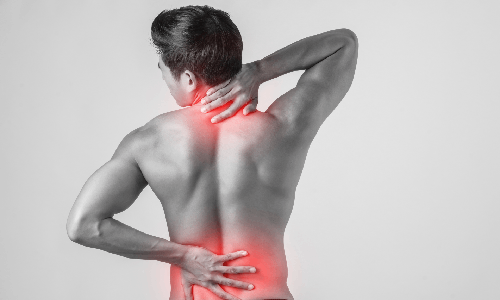Recently, someone approached me asking about Ayurvedic treatment for Ankylosing Spondylitis. This led me to realize that I haven’t discussed this health condition before. So, here’s some information about it!
What is Ankylosing Spondylitis?
Ankylosing Spondylitis (AS) is a chronic inflammatory condition – a rare form of arthritis that primarily affects the spine and large joints. It belongs to a group of conditions known as spondylarthritis that usually starts at the lower aback and eventually spreads up to the neck and other damaged joints.
Although Ankylosing Spondylitis is less common than other forms of arthritis, it still affects a significant number of people worldwide. Studies show that approximately 0.1% to 0.5% of the global population suffers from the condition.
Amavata is the word associated with rheumatoid arthritis in Ayurveda. However, the word also refers to other painful conditions as well and that includes Ankylosing Spondylitis. Ayurveda categorizes Ankylosing Spondylitis based on the body part it affects: Prishtagata (back), Katigata (lumbo-sacral), or Grivagata (pelvis or neck – cervical region) Amavata.
The Symptoms
Ankylosing Spondylitis often begins with inflammation in the joints where your spine connects to your pelvis, called the sacroiliac joints. This can make your lower back and hips feel painful and stiff.
As it progresses, Ankylosing Spondylitis can affect other areas where your tendons and ligaments attach to bones. In some cases, it may even cause your vertebrae – the bones in your spine, to fuse together. In extreme situations, the condition may also result in your spine becoming hunched.
Other signs of Ankylosing Spondylitis you might experience include:
- Neck feeling sore or stiff
- Pain in your shoulders
- Feeling pain and stiffness around your ribcage
- Pain in your hips or thighs
- Feeling pain in your feet, heels, or hands
- Pain that is worse in the morning or after sitting for a long time
- Noticing your spine becoming rigid and curving forward
- Feeling tired
- Swelling in your joints
Ankylosing Spondylitis is frequently observed in males in their teenage and 20s, although it can affect individuals of any age. Women typically experience milder symptoms that often go unnoticed.
Everyone’s experience with Ankylosing Spondylitis is different. Your symptoms might change faster or slower than someone else’s, and they might not be exactly the same. It is common for your symptoms to come and go, with times when they get worse followed by times when they improve.
Ankylosing Spondylitis as per Ayurveda
According to Ayurveda, Ankylosing Spondylitis happens when Ama (toxins) accumulate in the body due to the imbalance of the three Doshas – Vata, Pitta, and Kapha. Ama, carried by the air element called Vayu, settles in places where the Kapha Dosha is prominent, mostly in the joints. It further moves to the body’s circulation channels and becomes the root cause of diseases. The aggravated Ama and Vata jointly enter the pelvic region (sacro-iliac and lumbo-sacral areas) causing stiffness and what is known as Amavata.
The Treatment
Modern medicine does not offer a permanent cure for Ankylosing Spondylitis. However, the symptoms can be suppressed using medications, physical therapy and even surgery.
According to Ayurveda, Amavata is the most difficult to treat (Sa Kashta Sarva Roganam), especially when the condition is in its progressive state. However, it can be completely healed through lifestyle modifications and dietary changes, external and internal treatments and herbal medicines in the beginning stages.
The treatment for Amavata involves practices like Langhana, Swedana (sudation) and Abhyanga that help alleviate pain and swelling by providing warmth, which helps reduce inflammation and stiffness in muscles. There are also Panchakarma therapies like Virechana (purgation) and Vasti (enema) that help manage Ankylosing Spondylitis by rejuvenating and eliminating toxins from the body.
Regular exercise and adequate sleep are equally important to help you heal. Dietary changes include avoiding inflammatory and trigger foods and having foods that suit you. Also, herbal medicines are administered based on your Prakriti (body type), health conditions and Doshas.
Ankylosing Spondylitis is a chronic inflammatory condition that can significantly impact the quality of life of those affected. Ayurvedic treatment for Ankylosing Spondylitis targets the root cause and imbalances, focusing on lifestyle modifications, dietary changes, herbal medicines, and Panchakarma therapy. As with any medical condition, it is essential to consult with a qualified Ayurvedic doctor to ensure safety and efficacy.
